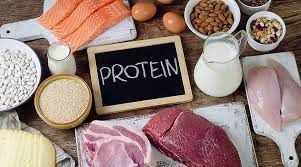
This article originally appeared in Panorama Community Magazine in July 2022
This month, I appreciate the opportunity to write on the topic of protein! I received some feedback from people that this was a topic they wanted to learn more about. And, truth be told, it is an area where many people experience some challenges. Let’s learn about the importance of protein and strategies to help you consume more of it!
Why focus on Protein?
Protein is essential for many biological functions within our body. There is not enough room within one article to discuss all the roles protein plays in our body; however, I will discuss just a few here.
One major function is muscle building and repair, as well as supporting our bones, tissues, ligaments, and immune system. Our goal across our lifetime is to preserve our muscle mass to help support greater function. Therefore, it is essential we provide our body with the nutrition to do so. The more muscle mass we have, the higher our Basal Metabolic Rate (BMR) is, especially at rest. Why does this matter? The more muscle mass we have, especially for those trying to lose weight, particularly through fat loss, is that it means we burn more calories just by merely existing. In other words, when we have more muscle, we are burning more energy at rest compared to those who have less muscle mass.
Protein intake also supports a greater sense of satiety. In other words, it helps us feel fuller longer. For example, those who have a breakfast composed mainly of carbs, particularly fast-digesting carbs, are likely to be hungry not too long after they just ate. People often then choose another relatively unbalanced meal that is heavier on carbs…and this perpetuates the eating roller coaster throughout the day. On the other hand, those who begin their day with a meal higher in protein, or who make the effort to add more protein to their meals, find their hunger much more manageable.
Another benefit of protein intake is its thermogenic effects within the body. It takes more energy on behalf of our body to digest and process protein which means our body “burns more calories” by simply going through the natural processes of digestion.
Strategies to help you consume more protein
What you might be thinking now is “great…we know protein is good for us…but how do we fit more of it into our nutrition?” Let’s review some strategies for incorporating more into your daily nutrition.
First, let’s look at what foods are generally considered higher in protein. For the most part, there are no inherently “bad” foods. On the other hand, there are foods we would benefit from eating “more” of, eating “some” of, and perhaps eating “less” of. I have a great infographic from Precision Nutrition that I’d love to share with you which provides some helpful information regarding protein sources. (Email me today and I’d be happy to send that right out to you!). This list serves as a great guide when planning out your meals each day or for the week. Take it with you when you go to the store for some inspiration on what to choose!
Next, you may be wondering, “how much protein should I be eating?”. It depends a lot on the individual and their current body composition, their age, and their activity level. Protein needs will also be dependent potentially on certain medical conditions. A broad guideline is anywhere from 0.8-1.2 grams of protein per pound of bodyweight. For example, with an average weight of 165 pounds, I eat anywhere from 160-170 grams of protein daily. One tip might be to plan out your protein first and once you have laid out the plan for that, everything else falls into place much easier.
One strategy I use to consume enough protein is to prepare it in bulk. Each week, I pick two protein sources, such as chicken and beef, and I cook a big batch of it up and have one for lunch and the other for dinner. Each protein source (beef, chicken, pork, fish, etc.) has a different amino acid makeup. Therefore, to help ensure I do not become deficient in any one amino acid, I rotate through my proteins generally every other week. If I do chicken and beef one week, I might switch to pork, turkey, or fish the following week. Generally, I try to have fish 1-2 times per week each week.
There is no reason for eating well to be boring and tasteless! Just because you are having one key ingredient (for example, chicken) doesn’t mean you can’t still have variety! I have a great guide for how to use one batch of prepped chicken to make a variety of meals – email me today and I would be happy to share it with you!
Lastly, it helps to know our “why” behind why we do things. I encourage you to shift from an outcome-based thinking (such as “I want to weigh x number of pounds”) and instead focus on the process (for example, “I am eating to nourish my body and support my goals”). Personally, I tend to view my nutrition as “fueling my muscles” or “fueling my performance”. When I fuel my muscles and/or fuel my performance, accomplishing my goals (body recomposition, getting stronger/fitter, etc) becomes the side effect of my efforts.
